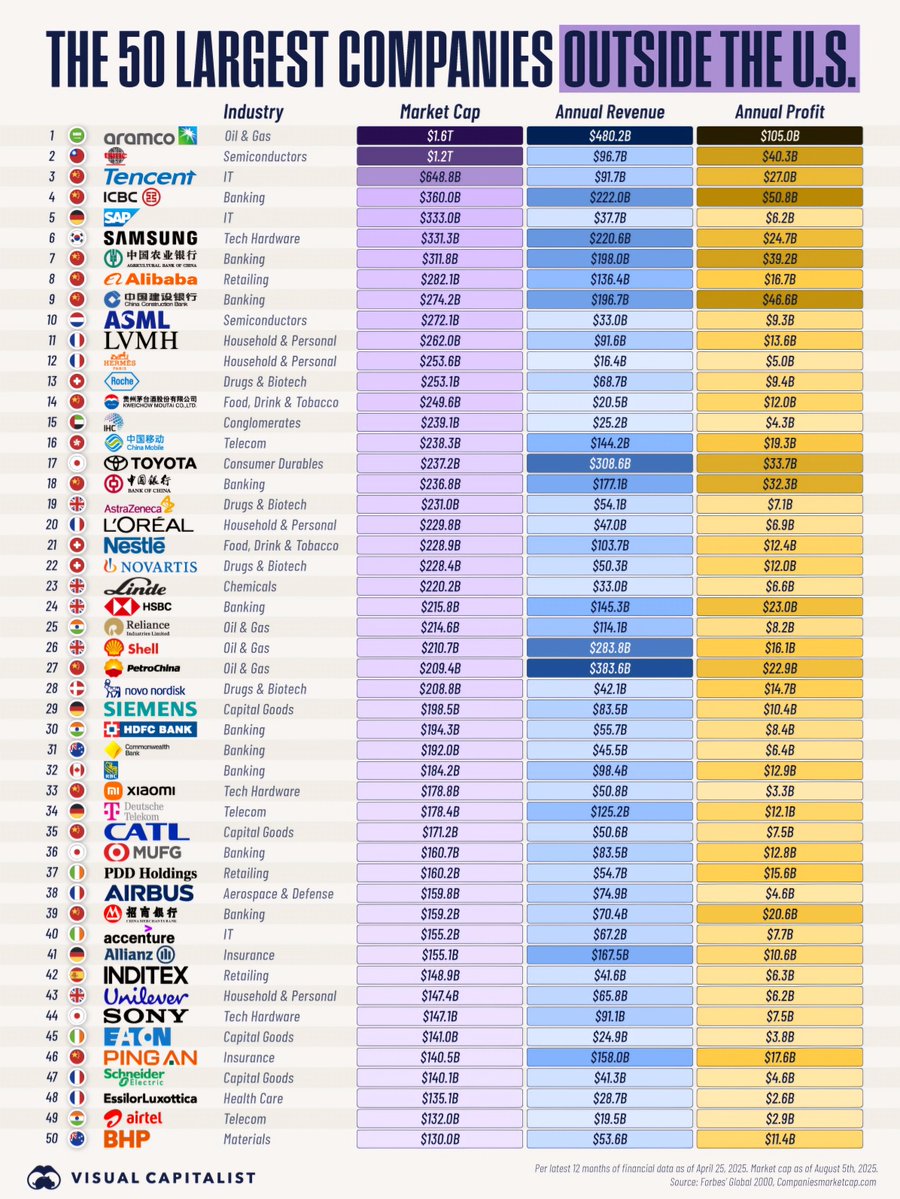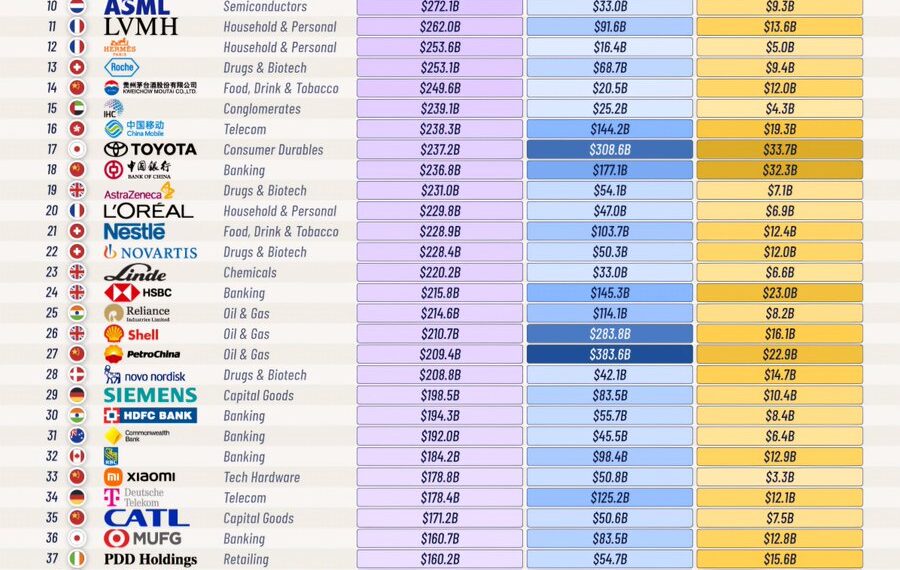Select Language:
Top 50 International Companies Dominating the Global Market in 2025

1. Sasol (South Africa)
Sasol continues to be Africa’s leading energy and chemical company, leveraging advanced technology to produce synthetic fuels and chemicals. Its focus on sustainability and innovation keeps it at the forefront of the continent’s economy.
2. Tata Group (India)
India’s Tata Group maintains its position as a multinational conglomerate with diversified interests spanning automobiles, steel, IT, and hospitality. Its expansion into renewable energy sources signals a commitment to green growth.
3. China National Petroleum Corporation (CNPC)
As one of China’s giants, CNPC remains a powerhouse in oil and gas exploration and production, with significant investments in renewable energy projects to transition towards a more sustainable portfolio.
4. Naspers (South Africa)
This South African multinational continues to be a key player in online media, e-commerce, and fintech sectors, expanding its influence across emerging markets in Africa and Eastern Europe.
5. BMW Group (Germany)
BMW’s innovation in electric vehicles and autonomous driving tech cements its status as one of the largest and most influential automotive manufacturers globally.
6. Mitsubishi Group (Japan)
Mitsubishi has diversified beyond automotive manufacturing into areas like logistics, banking, and energy, adapting to the changing demands of the global market.
7. Reliance Industries (India)
Reliance’s diversified business includes petrochemicals, refining, telecommunications, and retail, solidifying its role as a driving force in India’s economic growth.
8. China State Construction Engineering Corporation (CSCEC)
CSCEC remains a dominant player in infrastructure construction, with major projects across Asia, Africa, and the Middle East focusing on sustainable and smart city development.
9. Samsung Electronics (South Korea)
Samsung’s continued development of cutting-edge electronics and semiconductor technology has kept it at the top of global consumer tech markets.
10. LVMH (France)
The luxury conglomerate persists as a dominant force in high-end fashion, cosmetics, and wines, expanding its global footprint with a focus on sustainability and heritage crafts.
11. Tata Steel (India)
Tata Steel’s focus on sustainable production methods and innovations in steel technology support India’s infrastructure boom and global industrial demands.
12. CNH Industrial (Italy)
Specializing in agricultural and construction equipment, CNH Industrial is advancing its autonomous and electric machinery lines to meet global sustainability targets.
13. PetroChina (China)
Fueling China’s economic expansion, PetroChina invests heavily in oil, gas, and emerging renewable projects, framing itself as a transitional energy leader.
14. Honda Motor Co. (Japan)
Honda’s push toward electric and hybrid vehicles ranks it among the top automotive players embracing sustainability.
15. The Estée Lauder Companies (United Kingdom)
Valorizing luxury cosmetics and skincare, Estée Lauder continues to innovate in beauty tech and sustainable packaging.
16. Air Liquide (France)
A leader in industrial gases, Air Liquide is pioneering eco-friendly production processes amidst a global push for sustainable manufacturing.
17. Hyundai Motor Company (South Korea)
Hyundai invests increasingly in hydrogen fuel cell technology and EVs, aiming to set new standards in eco-friendly mobility.
18. China Mobile (China)
With widespread 5G infrastructure, China Mobile remains vital in Asia’s telecommunications scene, expanding into IoT and smart city solutions.
19. Glencore (Switzerland)
Glencore’s commodity trading and natural resource management adapt to volatile markets, with an eye on sustainability and ethical sourcing.
20. Infosys (India)
A leading IT services provider, Infosys continues to grow in cloud computing, AI, and digital transformation sectors across the globe.
21. Baidu (China)
Baidu’s advancements in autonomous vehicles, AI, and cloud services help it maintain its influence in Asia’s tech industry.
22. L’Oréal (France)
Innovation in personalized beauty and sustainable sourcing keeps L’Oréal at the forefront of global cosmetics brands.
23. KIA Motors Corporation (South Korea)
KIA’s increasing focus on electric vehicles and smart technology enhances its competitive edge among global automakers.
24. Heineken NV (Netherlands)
Persisting in its global beer dominance, Heineken invests heavily in sustainable brewing and environmentally friendly packaging.
25. Hitachi Ltd. (Japan)
Hitachi specializes in clean energy solutions, next-generation transportation, and IoT technology, reinforcing its global tech leadership.
26. Anglo American (UK)
As a major mining corporation, Anglo American explores sustainable extraction practices and the development of electric mining equipment.
27. Vale (Brazil)
This mining giant shifts toward greener operation practices while expanding mineral supplies crucial for battery technology.
28. Sony Corporation (Japan)
Sony leads in entertainment, electronics, and gaming, with significant investments in virtual reality and 8K technology.
29. SAP SE (Germany)
SAP’s enterprise software solutions continue to innovate, with increased emphasis on cloud, AI, and data security.
30. CNCEC (China)
A rising star in construction and engineering, CNCEC focuses on smart/digital infrastructure projects across Asia and Africa.
31. Emirates Group (UAE)
Major global airline and tourism conglomerate, Emirates focuses on expanding sustainable aviation fuels and eco-efficient aircraft.
32. Sberbank (Russia)
Russia’s largest bank adapts to digital banking trends, investing heavily in fintech startups and blockchain technology.
33. Nestlé S.A. (Switzerland)
Nestlé’s push towards plant-based products, sustainability, and nutrition innovation bolster its massive global footprint.
34. Tata Power (India)
A key renewable energy player, Tata Power accelerates solar and wind projects aligned with India’s clean energy goals.
35. Petrobras (Brazil)
Brazil’s oil giant explores carbon capture technology and renewable energy investments amid global energy transitions.
36. Royal Philips (Netherlands)
Focusing on healthcare innovations, Philips expands into connected health and personalized medicine.
37. PJSC Lukoil (Russia)
Lukoil increases its renewable energy investments to reduce carbon emissions while maintaining oil production.
38. Tata Communications (India)
Key provider of global connectivity, Tata Communications pushes into 5G, edge computing, and cybersecurity.
39. Singapore Airlines (Singapore)
Leading in sustainable aviation, Singapore Airlines invests in newer, fuel-efficient aircrafts and greener operations.
40. Danone (France)
A global leader in food and beverage, Danone emphasizes organic, plant-based products, and sustainability efforts.
41. Cigna Group (UK)
Global health insurer, Cigna prioritizes digital health services, telemedicine, and sustainable healthcare practices.
42. State Bank of India (India)
Expanding digital banking and fintech collaborations, SBI plays a vital role in India’s financial inclusion push.
43. A.P. Moller-Maersk (Denmark)
Container shipping giant Maersk invests heavily in green shipping solutions and digital logistics platforms.
44. Tata Communications (India)
Enhancing global digital infrastructure, Tata Communications focuses on AI-driven network solutions and cloud services.
45. Inditex (Spain)
Parent company of Zara, Inditex adopts circular fashion models and sustainable supply chain practices to attract conscious consumers.
46. Sumitomo Mitsui Trust Holdings (Japan)
Leading in asset management and financial services, Sumitomo Mitsui Trust emphasizes green investments and ESG standards.
47. Unilever (UK)
Unilever advances its sustainability goals with eco-friendly packaging and a focus on responsible sourcing in personal care and household products.
48. BHP Group (Australia)
BHP invests in transforming its mining operations with a focus on lower emissions, automation, and sustainable resource management.
49. LG Electronics (South Korea)
LG leverages AI and IoT in consumer electronics, expanding into energy-efficient appliances and smart homes.
50. Eni S.p.A. (Italy)
Italy’s leading energy company invests significantly in renewable projects, including wind, solar, and green hydrogen initiatives.
As global industries evolve, these 50 companies exemplify resilience, innovation, and a growing commitment to sustainable growth. With expanding footprints across continents and industries, their strategic shifts reflect the world’s changing economic and environmental landscape in 2025.





